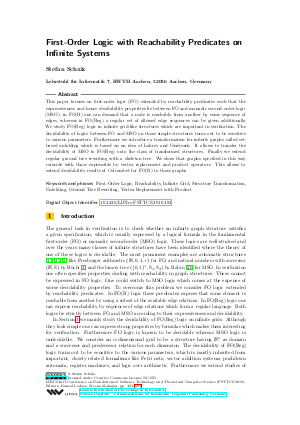First-Order Logic with Reachability Predicates on Infinite Systems
Author Stefan Schulz
-
Part of:
Volume:
IARCS Annual Conference on Foundations of Software Technology and Theoretical Computer Science (FSTTCS 2010)
Part of: Series: Leibniz International Proceedings in Informatics (LIPIcs)
Part of: Conference: IARCS Annual Conference on Foundations of Software Technology and Theoretical Computer Science (FSTTCS) - License:
 Creative Commons Attribution-NonCommercial-NoDerivs 3.0 Unported license
Creative Commons Attribution-NonCommercial-NoDerivs 3.0 Unported license
- Publication Date: 2010-12-14
File

PDF
LIPIcs.FSTTCS.2010.493.pdf
- Filesize: 0.59 MB
- 12 pages
Document Identifiers
Subject Classification
Keywords
- First-Order Logic
- Reachability
- Infinite Grid
- Structure Transformati on
- Unfolding
- Ground Tree Rewriting
- Vertex Replacement with Product
Metrics
- Access Statistics
-
Total Accesses (updated on a weekly basis)
0PDF Downloads0Metadata Views
Abstract
This paper focuses on first-order logic (FO) extended by reachability predicates such that the expressiveness and hence decidability properties lie between FO and monadic second-order logic (MSO): in FO(R) one can demand that a node is reachably from another by some sequence of edges, whereas in FO(Reg) a regular set of allowed edge sequences can be given additionally. We study FO(Reg) logic in infinite grid-like structures which are important in verification. The decidability of logics between FO and MSO on those simple structures turns out to be sensitive to various parameters. Furthermore we introduce a transformation for infinite graphs called set-based unfolding which is based on an idea of Lohrey and Ondrusch. It allows to transfer the decidability of MSO to FO(Reg) onto the class of transformed structures. Finally we extend regular ground tree rewriting with a skeleton tree. We show that graphs specified in this way coincide with those expressible by vertex replacement and product operators. This allows to extend decidability results of Colcombet for FO(R) to those graphs.
Cite As Get BibTex
Stefan Schulz. First-Order Logic with Reachability Predicates on Infinite Systems. In IARCS Annual Conference on Foundations of Software Technology and Theoretical Computer Science (FSTTCS 2010). Leibniz International Proceedings in Informatics (LIPIcs), Volume 8, pp. 493-504, Schloss Dagstuhl – Leibniz-Zentrum für Informatik (2010)
https://doi.org/10.4230/LIPIcs.FSTTCS.2010.493
BibTex
@InProceedings{schulz:LIPIcs.FSTTCS.2010.493,
author = {Schulz, Stefan},
title = {{First-Order Logic with Reachability Predicates on Infinite Systems}},
booktitle = {IARCS Annual Conference on Foundations of Software Technology and Theoretical Computer Science (FSTTCS 2010)},
pages = {493--504},
series = {Leibniz International Proceedings in Informatics (LIPIcs)},
ISBN = {978-3-939897-23-1},
ISSN = {1868-8969},
year = {2010},
volume = {8},
editor = {Lodaya, Kamal and Mahajan, Meena},
publisher = {Schloss Dagstuhl -- Leibniz-Zentrum f{\"u}r Informatik},
address = {Dagstuhl, Germany},
URL = {https://drops.dagstuhl.de/entities/document/10.4230/LIPIcs.FSTTCS.2010.493},
URN = {urn:nbn:de:0030-drops-28896},
doi = {10.4230/LIPIcs.FSTTCS.2010.493},
annote = {Keywords: First-Order Logic, Reachability, Infinite Grid, Structure Transformati on, Unfolding, Ground Tree Rewriting, Vertex Replacement with Product}
}
